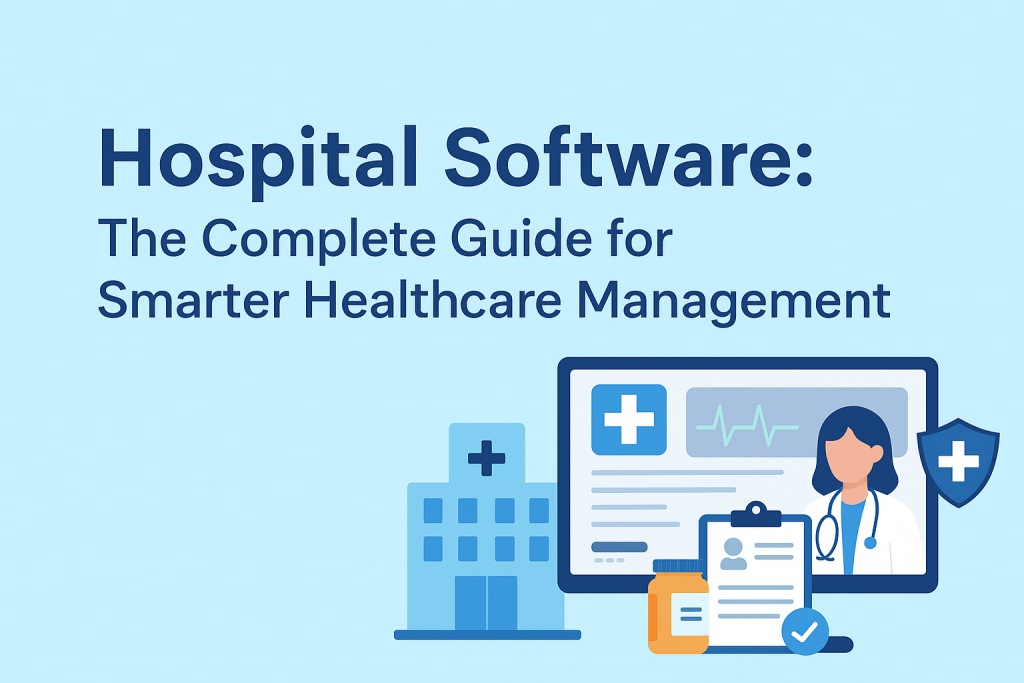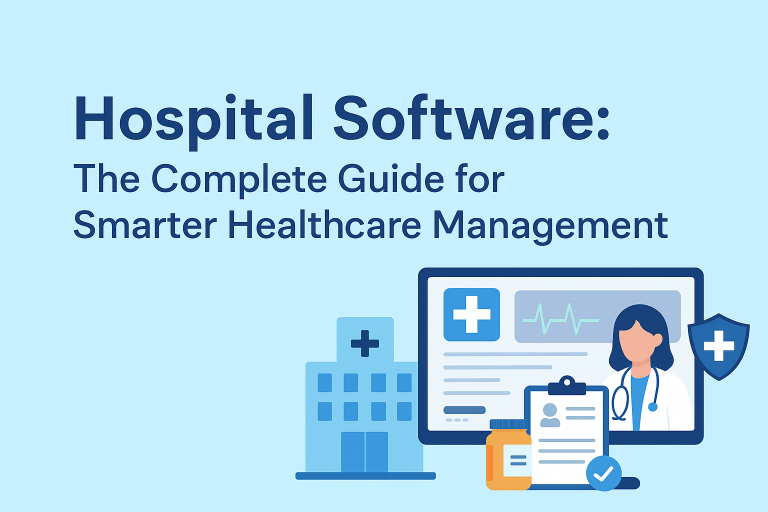Healthcare is rapidly changing, and technology now plays a huge role in improving patient care. Among the many innovations, hospital software stands out as one of the most powerful tools driving this transformation. Whether you are running a small clinic, managing a large hospital, or leading a multi-specialty healthcare chain, the right healthcare management software can streamline operations, reduce errors, and ultimately provide better services to patients.
In this detailed guide, we will not only answer the most common questions about hospital software but also explain how it works, why it is essential, and which features matter most. Moreover, we will also explore related solutions such as hospital management software, laboratory software, and even pharmacy management software to give you a complete understanding of modern healthcare technology.
What is Hospital Software?
Hospital software is a digital solution that helps hospitals manage patients, staff, billing, appointments, reports, and medical records in one centralized platform.
Traditionally, hospitals relied on manual registers and paper files to track patient records, staff schedules, and billing details. However, this system often resulted in delays, mistakes, and inefficiency. Fortunately, with hospital software, all these processes move to a centralized digital platform.
This means:
- Doctors can quickly access complete patient history.
- Patients can conveniently book appointments online.
- Staff can easily manage schedules and tasks.
- Administrators can monitor hospital performance in real time.
Therefore, the main goal of hospital software is simple: to make healthcare management easier, faster, and far more accurate.
Why Do Hospitals Need Software?
It could appear overwhelming at first to switch from paper-based methods to digital platforms. However, the benefits are undeniable and far-reaching. Let’s examine why hospitals worldwide are adopting hospital software at such a rapid pace:
- Improved Patient Care – Doctors gain instant access to full patient history, which significantly reduces medical errors.
- Faster Operations – From patient registration to billing, every task becomes automated and seamless.
- Cost Savings – With less paperwork, fewer mistakes, and better resource utilization, costs go down dramatically.
- Data Security – Digital storage with backup and encryption ensures safety and compliance.
- Scalability – Whether managing 100 patients or 10,000, hospital software adapts and grows with your needs.
Consequently, hospitals that switch to digital systems can operate more efficiently while improving overall patient outcomes.
Features of a Good Hospital Software
When selecting hospital software, it is crucial to know which features truly matter. Furthermore, it is equally crucial to make sure that the program is dependable and easy to use. Here’s a detailed breakdown:
- Electronic Medical Records (EMR): Store and access comprehensive patient history without hassle.
- Appointment Scheduling: Make it simple for patients to make, change, or cancel appointments.
- Billing & Invoicing: Ensure automated, accurate billing for both insurance and direct payments.
- Inventory Management: Keep track of medicines, equipment, and hospital supplies.
- Reporting & Analytics: Monitor hospital performance with data-driven dashboards.
- Integration with Laboratory Software: Access lab test results directly from the system.
- Integration with Pharmacy Management Software: Enable seamless medicine dispensing and stock updates.
Thus, by ensuring these features are present, hospitals can guarantee smoother day-to-day functioning.
Difference Between Hospital Software and Hospital Management Software
In summary, hospital management software is a more comprehensive system that consists of hospital software as well as other administrative tools.
While hospital software primarily focuses on clinical and operational tasks, hospital management software is more comprehensive. In other words, it not only manages patients and doctors but also covers HR, payroll, finance, and compliance.
For instance:
- Hospital software allows a doctor to view patient test reports.
- Hospital management software also helps HR teams manage staff salaries.
Therefore, if you are running a large hospital or healthcare group, hospital management software may be a better long-term investment.

Role of Laboratory Software in Hospitals
Laboratories play a crucial role in healthcare, and delays in lab reports can seriously affect treatment. Consequently, laboratory software has become essential for modern hospitals.
It allows hospitals to:
- Automate test booking and reporting.
- Minimize human errors in test results.
- Share lab reports directly with doctors.
- Maintain a complete history of tests for each patient.
Moreover, when integrated with hospital software, laboratory software ensures a seamless patient journey—from diagnosis to treatment.
How Pharmacy Management Software Complements Hospital Software
Pharmacies form the backbone of any hospital, and managing them manually is both difficult and error-prone. This is where pharmacy management software becomes indispensable.
It helps hospitals by:
- Tracking medicine stock in real time.
- Preventing stockouts and shortages.
- Generating accurate bills instantly.
- Ensuring compliance with strict drug regulations.
Furthermore, when connected with hospital software, pharmacy management software ensures patients receive prescribed medicines without unnecessary delays. As a result, it greatly improves overall patient satisfaction.
Benefits of Using Hospital Software
By now, it is clear that implementing hospital software is not just a trend but a necessity. So, let’s look at the key advantages hospitals enjoy:
- Better Patient Experience: Faster check-ins, online booking, and smooth billing processes.
- Accurate Records: No misplaced documents or missing files.
- 24/7 Accessibility: Cloud-based hospital software allows staff to access data anytime, anywhere.
- Regulatory Compliance: Hospitals can easily keep track of legal and medical standards.
- Improved Efficiency: Staff spend less time on paperwork and more time on patient care.
Therefore, it is no surprise that hospitals across the globe are adopting these systems at an unprecedented pace.
How to Choose the Best Hospital Software?
If you are planning to adopt hospital software, follow this practical step-by-step guide:
- Define Your Needs: Are you a small clinic or a large hospital chain?
- Check Integrations: Does it connect seamlessly with laboratory and pharmacy systems?
- User-Friendliness: Does it require a lot of training for employees to learn and use?
- Security: Does it offer strong encryption and role-based access?
- Cost: Does it fit your budget without compromising essential features?
In addition, it’s always wise to compare options, request demos, and read customer reviews before making a decision.
FAQs on Healthcare Management Software
Q1. What is hospital software used for?
Answer: Hospital software is used to manage patients, doctors, billing, appointments, and medical records in one centralized system.
Q2. Is hospital software suitable for small clinics?
Answer: Yes. Many hospital software solutions are designed for clinics, making management easier, faster, and more cost-effective.
Q3. How does hospital software differ from hospital management software?
Answer: Hospital software focuses on patient and doctor interactions, while hospital management software also includes administrative tasks like HR, payroll, and finance.
Q4. How does laboratory software help hospitals?
Answer: Laboratory software automates test reports, reduces errors, and integrates lab data directly with hospital records.
Q5. What is pharmacy management software?
Answer: Pharmacy management software helps track medicines, prevent stock shortages, and integrate pharmacy operations with hospital billing systems.
Final Thoughts: Healthcare Management Software
In conclusion, adopting hospital software is no longer a luxury—it has become an absolute necessity. With features like EMR, appointment scheduling, billing, and seamless integration with both laboratory software and pharmacy management software, hospitals can deliver faster, safer, and more efficient care.
Moreover, for larger facilities, upgrading to hospital management software provides even better control and scalability. Therefore, as healthcare demands continue to rise, hospitals that invest in the right digital tools will always be better positioned to serve patients effectively.
So, if you are still managing hospital operations manually, now is the right time to embrace digital transformation. Not only will it improve patient care, but it will also ensure your hospital stays ahead in the rapidly evolving world of healthcare.

